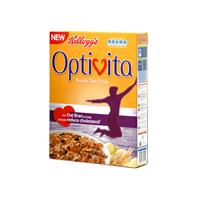
Its the most important meal of the day and, as of today, Britain has a group of experts which are committed to highlighting all the benefits of breakfast and encouraging people to make the most of this meal.
The new Breakfast Panel, launched recently, comprises academics, researchers, GPs, nutritionists and dieticians, all of whom are passionate about getting to the bottom of why breakfast is so important. Together they will undertake independent research, review other studies, inform, educate and comment on issues about breakfast, breakfast options and breakfast consumption.
The members of The Breakfast Panel are:
Prof Ian Banks BSc Bch MB MSc PhD

Prof Jeya Henry BSc MSc PhD

Prof Chris Seal BSc PhD RNutr MIFST

Sara Stanner BSc(Hons) MSc RPHNutr

Dr Chris Steele MBE MB ChB

Details of their biographies can be viewed on The Breakfast Panels web site www.BreakfastPanel.org
A new research review from Kings College London has uncovered that:
Breakfast usually contributes 9-36% of micronutrient intakes to the overall diet
Skipping breakfast can lead to an unhealthy pattern of snacking on high-fat foods throughout the morning
Eating breakfast has been linked with better test grades and school attendance in children and adolescents
A bowl of wholegrain cereal is as good as a sports drink for recovery after exercise
Having a wholesome breakfast such as cereal and milk is linked to eating less fat later in the day and maintaining a healthy weight
By ensuring the consumption of recommended fibre levels this can lead to improved bowel performance e.g. prebiotic effect
Low GI/ high fibre breakfasts have been show to increase satiety and improve results in attention and memory tests
Breakfast cereal consumption has numerous health benefits to our wellbeing, with scientific research clearly demonstrating these health benefits. Many independent nutritionists and dieticians recommend the need for cereals as a vital dietary requirement.
Commenting further on how breakfast cereals can improve the quality of the diet, Dr Leonard, an independent advisor to the Breakfast Cereal Information Service notes: Firstly, breakfast cereals make an important contribution to the intake of essential micronutrients, including vitamins such as B vitamins and vitamin E as well as minerals, such as magnesium and zinc. Consuming breakfast cereals with milk increases vitamin and mineral intake still further, particularly calcium, riboflavin and vitamin A.
Dr Sanjay Prasad from the heart and stroke charity CORDA adds: Cereals are also a valuable source of fibre. Specific products also contribute to the intake of essential fats from nuts, soluble fibre from oat-based cereals and the governments 5-a-day fruit and vegetable target due to dried fruit content.
Dr Leonard continues: Secondly, eating breakfast cereals is linked with improved diet quality throughout the day, not least at breakfast time itself. Evidence shows that people who eat breakfast cereals in the mornings tend to choose less fatty food, particularly snacks such as biscuits, cakes and sweets, later on. This influence on meal choice could be due to factors such as the fibre content of breakfast cereals. Fibre, of course, is associated with healthy bowel function.
Dr Leonard adds: Breakfast cereals are also lower in fat, including saturated fat, than most other types of breakfasts. Overall, breakfast cereal consumption is associated with eating less fat throughout the entire day, which has implications for cardiovascular health and maintenance of healthy weight. Indeed, evidence suggests that people who eat breakfast cereal are more likely to have a healthy BMI than those who dont.
Breakfast cereal consumption is also associated with better cognitive function, academic performance and school behaviour. Research shows that attendance at school breakfast clubs is linked with improved maths grades, while school absence and psychosocial problems are reduced.
So in a nutshell breakfast cereals provide many health benefits and as a result, consumption of breakfast is vital and helps ensure a healthy start to the day. Unfortunately, skipping breakfast is all too common. Data shows that one in six children skips breakfast every day. Evidence shows that people who do not eat breakfast are less likely to meet their requirements for vitamin A, riboflavin, folic acid, vitamin B6, vitamin D and calcium. Skipping breakfast is also associated with weight gain and obesity and reduced mental function, including poor attention, memory and learning.
Some recent information campaigns have looked at the whole issue of salt and sugar in breakfast cereals, and here the facts are very clear. Breakfast Cereals contribute less than 5% salt and sugar (some of which will be intrinsic sugars from dried fruit in many varieties) to the daily diet. Indeed, the FSA sodium target of 0.3g/100g for these products has practically been reached. By 2010, breakfast cereals will be just 0.02g/100g off this target. Evidence indicates that just 2.7% of UK sodium consumption comes from breakfast cereals. This is a direct result of the salt content of breakfast cereals being reduced by 44% since 1998.
In terms of labelling, breakfast cereal manufacturers are also leading the way in clearer nutritional labelling via the use of Guideline Daily Amounts (GDAs). The EU project, FLABEL (Food Labelling to Advance Better Education for Life) has recently announced British breakfast cereals as the best food category in Europe for providing clear nutrition communication to consumers on packaging. The GDA labels that are now available on many cereal brands enable consumers to clearly note the levels of sugar and salt and other nutrients that are contained in a suggested portion. The label also allows people to make easy comparisons within the breakfast category and ensures they are able to monitor their nutrient intake and remain within the recommended 6g of salt as part of their daily diet. When looking at the nutritional composition of breakfast cereals it is important to look at portion size, not 100g samples. Recommended serving sizes are marked on the packs and vary from 30g to 45g. The National Diet and Nutrition Survey (NDNS) shows that average consumption is 33g per day for men and 27g per day for women1, with 75% of this being wholegrain and high fibre varieties.
Looking at the whole area of claims, Dr Leonard points out: European Union legislation has set out two further routes for improving the information provided to consumers about the content of their food. The first route provides a statement of fact about the nutritional content of the food what is or isnt in the product, e.g., low in salt, low in sugar or a source of fibre. The second route enables companies to explain product health benefits via scientifically validated health claims, based on evidence approved by the European Food Safety Authority (EFSA).
The food industry welcomes these moves, and indeed has been working towards such changes for many years. Industry supports the harmonisation of the use of scientifically substantiated nutrition and health claims made on food products, enabling consumers to make informed and meaningful choices. EFSA has recently provided opinions on 523 health claims relating to food products. Again, industry welcomes the progress made in this area and looks forward to the next steps in the process, where Member States and the European Commission agree on a common EC-wide list of accepted claims.
In summary Dr Leonard comments: Breakfast should account for 20% of our Guideline Daily Amount intake of key nutrients and as a result is a daily must have. And contrary to other opinions, real facts demonstrate that the UK breakfast cereal category has clear nutritional labelling on pack, enabling the consumer to make well informed decisions over the contents of their food.
 The study, which involved 40 teenage girls, found that participants consumed more than 350 fewer calories on days when they missed breakfast, compared with the days when they ate breakfast.
The study, which involved 40 teenage girls, found that participants consumed more than 350 fewer calories on days when they missed breakfast, compared with the days when they ate breakfast.






